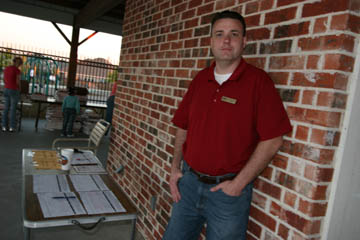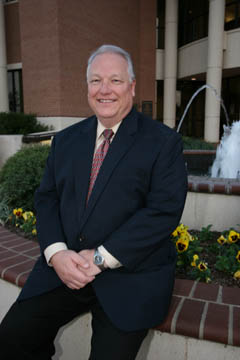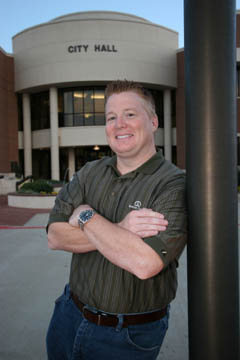Fort Worth’s suburban cities seem to have a real penchant for wacky political melodrama — dirty movie wars in Kennedale, endless infighting in White Settlement, an old-folks’ uprising in Haltom City.
 They’re all doubtless due, in part, to the growing pains that set in when little towns turn into little cities and people see their cottage ways being threatened by a condo culture. Now it’s Mansfield’s turn, and in May, a sixth-grade science teacher named Barton Scott landed the lead role, as mayor. His ticket to city hall was a fight against Condoms to Go; once elected, a crusade against sex fiends and bad developers was at the top of his agenda. Problem is, his supporting cast, like Hollywood screenwriters, have gone on strike. He can’t get a heck-yeah from the city council to save his soul (or, from his point of view, to save his city’s kids). He keeps running afoul of pesky little things like open meetings laws and campaign finance reporting requirements. His anti-development stance has upset many of the city’s chamber of commerce types. Even the police chief — reluctantly — has said the mayor’s proposed sex-offender ordinance is worse than useless. And if you’re not with Barton Scott, you’re against truth, justice, and the American way.
They’re all doubtless due, in part, to the growing pains that set in when little towns turn into little cities and people see their cottage ways being threatened by a condo culture. Now it’s Mansfield’s turn, and in May, a sixth-grade science teacher named Barton Scott landed the lead role, as mayor. His ticket to city hall was a fight against Condoms to Go; once elected, a crusade against sex fiends and bad developers was at the top of his agenda. Problem is, his supporting cast, like Hollywood screenwriters, have gone on strike. He can’t get a heck-yeah from the city council to save his soul (or, from his point of view, to save his city’s kids). He keeps running afoul of pesky little things like open meetings laws and campaign finance reporting requirements. His anti-development stance has upset many of the city’s chamber of commerce types. Even the police chief — reluctantly — has said the mayor’s proposed sex-offender ordinance is worse than useless. And if you’re not with Barton Scott, you’re against truth, justice, and the American way.
Scott, a former software company manager, seems flabbergasted by how tough this politics stuff has turned out to be. In his stylish living room a few weeks ago, the friendly but embattled-looking guy brought himself to tears, talking passionately about how worried he is about Mansfield’s children. He casts himself as a political novice, fighting what he sees as an entrenched system of cronyism and corruption that threatens to corrode Mansfield from within — even comparing himself to Jimmy Stewart’s squeaky-clean character in Mr. Smith Goes to Washington. But whereas Stewart’s Mr. Smith finally seemed to bring his congressional colleagues around to his way of thinking on an important vote, Scott is batting 0-for-3 in his attempts to push through an ordinance that would severely restrict where some convicted sex offenders could live in Mansfield. In Scott’s way of thinking, as other surrounding cities adopt such ordinances, his town in the southeast corner of Tarrant County could become something of a sex-offender mecca. Sexual predators, he said, are “literally salivating over the children of Mansfield.”
His opponents have a very different view of Scott’s crusading political style. They call him manipulative, paranoid, and uncompromising. Mansfield City Council member Cory Hoffman said Scott’s personal attacks and political backstabbing may have permanently damaged their relationship — and that he questions the moralistic mayor’s ethics. “He’s alienated everyone on that council,” Hoffman said. “He’s not the most honest guy you’ll ever meet. He’s been caught in a countless number of lies, and because of that there’s a trust factor that I don’t have with him anymore — and I doubt anyone on the council has anymore.” Scott hasn’t given up on his campaign, however. He’s literally taking his show on the road, going door to door to gather signatures on a petition to put the sex-offender ordinance on the ballot to allow Mansfield voters to decide on it themselves. “It’s not about me, it’s about the citizens of Mansfield,” he said, referring to the various controversies at city hall. “I feel like I’m here to improve the city. I’m a little bit of an idealist, but I never expected it to be like this.”
 The idealist could find himself grounded in the next few months, however. Scott said he’s been told by two council members that an effort is being organized to get him recalled. Dueling petitions — one for recall, the other for a sex-offender referendum — could be making the rounds soon. May 12, 2007, was a banner day for Barton Scott. He beat incumbent Mel Neuman by a margin of more than 600 votes to become Mansfield’s new mayor — the first political office he’s ever held. Many people had figured he had no chance to win. Scott’s campaign had focused almost entirely on two issues, slowing down the city’s development and protecting its children by enacting a tough ordinance that would restrict where sex offenders could live. Before he took office, Scott was best known for his community activism, which included leading an effort to toughen Mansfield’s sexually oriented business ordinance. He was renowned for his boundless energy and infectious enthusiasm and quickly developed a reputation as a leader. “The only reason I got involved was because an adult business called Condoms to Go was trying to move into our community,” he explained. “They [the condom store owners] were trying to say that they were no different than a CVS [drugstore] and trying to open up next to a family restaurant. I made a big crusade with that and got our sexually oriented business ordinance changed. I’m very proud of that.”
The idealist could find himself grounded in the next few months, however. Scott said he’s been told by two council members that an effort is being organized to get him recalled. Dueling petitions — one for recall, the other for a sex-offender referendum — could be making the rounds soon. May 12, 2007, was a banner day for Barton Scott. He beat incumbent Mel Neuman by a margin of more than 600 votes to become Mansfield’s new mayor — the first political office he’s ever held. Many people had figured he had no chance to win. Scott’s campaign had focused almost entirely on two issues, slowing down the city’s development and protecting its children by enacting a tough ordinance that would restrict where sex offenders could live. Before he took office, Scott was best known for his community activism, which included leading an effort to toughen Mansfield’s sexually oriented business ordinance. He was renowned for his boundless energy and infectious enthusiasm and quickly developed a reputation as a leader. “The only reason I got involved was because an adult business called Condoms to Go was trying to move into our community,” he explained. “They [the condom store owners] were trying to say that they were no different than a CVS [drugstore] and trying to open up next to a family restaurant. I made a big crusade with that and got our sexually oriented business ordinance changed. I’m very proud of that.”
The future seemed as bright for the 37-year-old mayor as it was for his town, which Money Magazine recently listed as one of the most desirable places to live in the country. In an e-mail to Scott, obtained by Fort Worth Weekly, council member Daryl Haynes expressed that optimism. Scott’s election represented “the start of a new era,” Haynes said. “You have my 100 percent support and backing.” Scott expected to make the sex-offender ordinance his first item of business, and certainly it has become the most talked-about issue in Mansfield local politics. But things didn’t go as he had planned — on that and many other topics. Currently, the city has no sex-offender ordinance. In all, nearly two dozen North Texas cities have passed some kind of residency restrictions on registered offenders. Arlington’s ordinance applies only to offenders with more than one conviction, whereas a city like Richardson has one similar to Scott’s proposed law, making about 98 percent of the city off-limits to sex offenders. Scott’s proposal would ban such offenders from living within 2,000 feet of any area where children congregate, such as schools, day care centers, and churches. The legislation also would require that homeowners, homeowner associations, schools, and other groups be notified when a “high-risk” pedophile — as determined by law enforcement agencies — moves into the area. It also prohibits landlords from renting properties to such offenders. Scott said that he was willing to compromise on the distance requirements in his initial proposal, which was 2,500 feet, but said that the council still wouldn’t accept it. In his mind, the council is fighting the ordinance simply because he’s the one who proposed it.
 The mayor has said publicly several times that he doesn’t want his city to become a “dumping ground” for predators, as other cities adopt tough sex-offender legislation. “We should have some sort of protection for our children,” he said. “I don’t think it’s a good idea for a pedophile to live next to a school, able to sit in their chair or on their lawn and meet children as they cross the street, and the more horrific thing I think about is [a pedophile] with a camera taking pictures.”
The mayor has said publicly several times that he doesn’t want his city to become a “dumping ground” for predators, as other cities adopt tough sex-offender legislation. “We should have some sort of protection for our children,” he said. “I don’t think it’s a good idea for a pedophile to live next to a school, able to sit in their chair or on their lawn and meet children as they cross the street, and the more horrific thing I think about is [a pedophile] with a camera taking pictures.”Critics of the proposed ordinance point out a number of flaws, not the least of which is that the distance requirement would essentially limit registered sex offenders in Mansfield to three neighborhoods, creating what Hoffman called “predator-friendly zones.” Residents fear that the property value of those neighborhoods would plummet — producing what they’re calling ghettoization. Council member Mike Leyman lives in one of the proposed “predator-friendly” neighborhoods, and he believes Scott doesn’t mind turning his neighborhood into a dumping ground. “By all maps I have seen, it will be OK for sex offenders to live next to me,” Leyman wrote in an e-mail to Scott. “So, I guess you feel that’s OK as long as they’re not in your neighborhood.”
Bridgette Arnold, a New York City transplant, also lives in one of the neighborhoods where predators would not be banned. Arnold said that after she and her husband moved to Mansfield in 2004, her parents and brother followed. But the proposed ordinance could cause her to pull up stakes, she said. “If the mayor’s legislation passes, we will see it as a sign that Mansfield is not the safe harbor that we thought it was, and we will move to a town more amenable to our values,” she said in an e-mail. “Deliberate ghettoizing by the city of Mansfield — essentially setting up a neighborhood especially for sex offenders — will end our commitment to this town.” Mansfield Police Chief Steve Noonkester was asked to make a presentation to the city council regarding the proposed ordinance. When he said he couldn’t support Scott’s recommendation, he was unwillingly tossed into the political firestorm. Scott publicly called out the respected 39-year veteran, saying he was misinformed and acting with political motives. The problem got worse after a rumor circulated that Scott was going to launch his petition drive at a children’s Halloween party sponsored by the police department. When Noonkester called the mayor to ask about the rumor, Scott denied that that was his plan, but said the fact that Noonkester even raised the question was an abuse of the police chief’s power.
Noonkester is the first to agree that he should not be involved in politics. He is frustrated by the amount of time he’s had to spend on the issue. “My job is to keep politics out of the police department,” he said. “All of a sudden, here I am in the middle of it. I’m not playing political games at all. My job is to advise the council. They have to ask me questions, and when they do, I give them the best opinion I can give, based on current studies, relevant facts, and my knowledge.” He called the mayor’s proposal a feel-good ordinance that would make politicians “feel warm in their beds,” but wouldn’t actually do any good. His objections are based on research that says 90 to 95 percent of sexual assaults on children occur in the home, perpetrated by parents, other family members, or trusted family friends — people who wouldn’t be affected by an ordinance regulating where repeat offenders could live. Noonkester said that the very incident described by Scott when he presented his proposal to the council bears out that objection. The case was one that occurred in Arlington a few years ago, in which a young girl was abducted and assaulted. The offender lived in another city, was a friend of the child’s babysitter, and had been in the apartment where the abduction had occurred before that day. Therefore, Noonkester said, the ordinance would not have prevented that assault.
In fact, the proposal that is causing so much uproar might not have prevented any assault that’s ever been reported to Mansfield police. According to Noonkester, the town has never had an offense committed by an already-registered sex offender. And none of the 21 sexual assaults on children reported to police last year would have been affected or prevented by the proposed residential restrictions, the police chief said. All but one of those occurred in the home, committed by either a parent or a family friend. The final assault report turned out to be a hoax fabricated by a teenager who eventually admitted that she made up the story. Scott said Noonkester is too focused on statistics as opposed to the big picture. “He doesn’t see the forest through the trees,” he said. “Communities want to do everything in their power to protect their children.” Noonkester also pointed out that, in Texas, city ordinances cannot designate offenses as anything more serious than a Class C misdemeanor, and when police find violations they can only write tickets. Opponents of the ordinance say the city government is being held hostage by this issue. City Manager Clay Chandler, who has had to play something of a mediator’s role in the drama, said that the city staff, including Noonkester and city attorneys, have had to spend a great deal of time researching, answering e-mails, and discussing the proposed ordinance.
“It is correct to say that the sex- offender issue has probably taken up more time than any other issue over the last six months. Every issue we have competes with something else,” Chandler said. “We have a lot of terrific things going on in Mansfield, and we have to be responsive to those issues. So anything that’s a demand on time or funds creates a little bit of a challenge.” He has also been put in the position of defending Noonkester and other city staffers against Scott’s accusations that they are conspiring against him. “We’ve done everything we can to not have a political agenda,” Chandler said. “This was the mayor’s issue, it wasn’t the police chief’s issue. He [Scott] went to the media, and the media called the police chief. The police chief did what I expect a professional to do: He gave his professional opinion, and for that [Scott] was critical.” Council members have also found themselves in Scott’s crosshairs over the ordinance, particularly Hoffman and Haynes, whom the mayor identified as the two most opposed to it.
Haynes said Scott is obsessing over an issue that will ultimately cost Mansfield lots of tax dollars when lawsuits start streaming in. “My view is that we already have a law,” that is, a state statute governing sexual assaults on children, he said. “Now, I don’t like these people. But I believe that what Barton is trying to do is punish a group of people that are protected under the constitution. … He is an extremist.” In September, a new statute called Megan’s Law went into effect in Texas. It sets out 25- to 99-year prison sentences for first-time convicted sex offenders, with no possibility of parole or probation. A second conviction draws a mandatory life sentence. Hoffman has arguably been Scott’s most outspoken critic. He said he doesn’t believe that Scott, who received only 200 more votes for mayor than Hoffman did in his race, can claim any mandate for the ordinance. “The fact that he believes he has a mandate tells me that he doesn’t believe that he needs to work with anybody to get anything done,” he said. “My attitude from day one on the council is that I’m simply one of seven up there. The sooner the mayor starts to realize that he’s just one of seven is the day that he’ll start trying to mend the bridges that he’s broken and start working with the rest of the elected representatives.”
 Scott has been issuing e-mails, via his web site, to update supporters on goings-on at city hall. On Aug. 15, he announced his intention to start a petition drive to put the sex-offender proposal on the ballot. In that same message, he suggested that “we have the wrong people serving on the city council.” “I made the motion to put this registered sex-offender ordinance in, and it’s been defeated,” he said. “Now, as a citizen, I’m doing a petition drive to bypass the council, and of course, they don’t like that — they see it as me not listening to their collective wisdom. They told me no [and they think] I should just shut up and listen.”
Scott has been issuing e-mails, via his web site, to update supporters on goings-on at city hall. On Aug. 15, he announced his intention to start a petition drive to put the sex-offender proposal on the ballot. In that same message, he suggested that “we have the wrong people serving on the city council.” “I made the motion to put this registered sex-offender ordinance in, and it’s been defeated,” he said. “Now, as a citizen, I’m doing a petition drive to bypass the council, and of course, they don’t like that — they see it as me not listening to their collective wisdom. They told me no [and they think] I should just shut up and listen.”
Scott has missed a couple of recent city council meetings on nights that he was allegedly seen collecting signatures for his petition drive. “On one meeting, [Scott told the council] he was unable to get a babysitter, and that evening when I spoke to him, he said he was getting signatures for his ordinance,” Leyman recalled. Scott said that in both cases he had legitimate reasons for missing the meetings and believes that the council is simply trying to discredit him. “That is definitely not accurate,” he said. “Last week I missed two meetings, one because I was sick and the other because I had babysitter issues. These individuals have done everything in their power to defeat this initiative, and here once again they’re coming up with one other reason to derail an effort that I think 75 to 80 percent of the community supports.”
The fight between the mayor and other members of the city government has been simmering since before Scott took office. In the last days of Mayor Neuman’s term, Scott was invited to sit in on city council sessions. He picked his first fight at the first meeting, objecting that the council was discussing things in executive session that should have been said publicly. “I raised my hand and said ‘guys, I have a problem with this,'” Scott said. “I had a real problem with them saying that they were going to talk to their attorney, and they did not talk to the attorney. When I raised the objection, the city attorney shut [the discussion] down. My very first experience in executive session, I saw something I wasn’t comfortable with.” In Scott’s mind, that showed that business-as-usual needed to end at city hall. But it also sowed the seeds of the resentment toward him. Those seeds, in fact were getting sown all over town, and many of them had to do with the second focus of Scott’s mayoral campaign — the idea that Mansfield is growing too fast, that the town’s character is being sacrificed to developers’ hunger for profit, and that too many of the new developments are bringing with them an urban lifestyle that Mansfield doesn’t need. Scott described an early meeting with some of the town’s most prominent landowners.
He said that Frank Bonilla, president of the Mansfield Economic Development Committee, arranged the session so landowners could tell him they would not willingly accept Scott’s promise to control the town’s growth. Bonilla brought his consultant, Randolph DeLay, brother of Tom DeLay, the highly controversial former U.S. House majority leader. “Their message to me was clear: ‘Your ideas that you ran on — limiting growth, opposing 10-story apartment complexes — we will never agree to. That idea scares us and we do not like that.'” Scott said. “They basically said, ‘It’s our land and we can do with it what we want,'” he continued. “I said it’s absolutely your land, and if you’re willing to pay for the schools to be built, and you want to pay for the roads, the firemen, the ambulances, and all of the services that you want the taxpayers to pay for, than I have no problem with you doing anything you want with your land. But what you want is for the taxpayers to subsidize the value of your land [with tax money to pay for infrastructure].” Scott said that his meeting with DeLay, Bonilla, and others was a watershed moment for him politically. Unfortunately though, it would be a sign of things to come, as more political fights waited on the horizon for the embattled mayor.
Take the case of Lance Ward, a homeowner who claims that his house was damaged by flooding from a crack in a city-owned water line that runs beneath the house. An official from the Environmental Protection Agency tested the air inside the house and determined that the mold levels were too high for anyone to safely live there. Standing water in and under parts of the house were causing damage to the interior and potentially the foundation. According to Mansfield City Attorney Allen Taylor, Ward is also claiming that his family has suffered from being exposed to the mold. Taylor said city workers investigated and determined that there was no leak in the water line. The city, therefore, is not responsible for any damages, he said. “They built that subdivision [where Ward’s house is] next to a major water line, and in order to ascertain whether or not there could be a problem, Bud Ervin [director of utility operations] went out there and literally had the line excavated,” Taylor said. “If there is a break in a line of that size, it would look like Niagara Falls — there would be water everywhere. And they could not find a break. What they found was water trickling in the gravel embedment below the line,” from a source that was never determined.
It’s the kind of dispute that happens between cities and residents all the time. But this one took an unusual turn when Scott got personally involved. He encouraged city officials to resolve the matter. The city put in a drain to divert the water.
In an e-mail to the city manager, Scott said that Ervin, the utility director, had told him he thought the water was coming from the city’s water-treatment plant but couldn’t be sure. “I’ve got a city staff that is not doing the right thing by a citizen whose house is being flooded,” Scott said later. Ward declined comment, on the advice of his attorney. No lawsuit has been filed.
A few months after he took office, it was Scott who was on the receiving end of complaints about abuse of the state’s open meetings act. The Mansfield council was considering installing cameras at some intersections to catch motorists running red lights. Scott said he felt that the city had to rush its decision because of a Sept. 1 deadline. After that time, a new state law requires cities installing such systems to have each intersection evaluated to show that the cameras are necessary — a costly process. So the mayor called two council members, Michael McSpadden and Gregg Kunasek, and invited them to an “educational” meeting with a vendor for the cameras. When Kunasek canceled, Scott invited Haynes, leaving a message on his answering machine.
Haynes said that as soon as he listened to the message, he was convinced that Scott had broken the open meetings law, by, in effect, arranging an unposted, not-open-to-the-public meeting of a quorum of the city council. “When I heard that voice mail, I said ‘Oh my gosh, I’ve been a part of crime,'” Haynes said. “I went to one of our attorneys [Bill Lane], and when he heard it, he almost fell out of his chair. We immediately called Allen Taylor, and he told me that I needed to write up what happened and turn it over for indictment, [and that] we don’t have a choice on this.” Haynes and others accused Scott of trying to line up a straw vote on the red-light camera issue, which would be illegal if not done in a public, legally advertised meeting. Scott said he didn’t realize that he had done anything improper and was simply trying to get enough information to make an informed decision on the issue. His opponents held up the incident as an example of how Scott, the so-called outsider, was playing the same kind of political games he has criticized. The red-light camera proposal was put on the ballot in August and voted down. No legal action has been taken against Scott or anyone else involved.
The next major battle was waged over a controversial campaign donation. Scott accepted a $2,000 contribution from Mario Perez, an attorney with Linebarger, Goggan, Blair, and Sampson of Fort Worth, the firm that collected debts for Mansfield. Perez is the godfather of Bart and Amy Scott’s daughter. However, Hoffman said that Scott told him that he didn’t know anyone from that law firm, and he didn’t know that the city had an $185,000 contract with the firm. Limited liability partnerships such as Linebarger can legally make political contributions. In fact, the contribution was made after the election, a common practice at Linebarger, which annually donates more than half a million dollars to political campaigns. However, council members, uneasy about the contribution, held a hearing to discuss the repercussions, then voted to end Mansfield’s relationship with the firm. Hoffman said he became suspicious when Scott’s campaign finance reports were filed 35 days late and city officials made him redo them — because the line naming the donor of the $2,000 was illegible.
Perez declined comment, but Scott called Hoffman’s claim that he didn’t know Perez “an absolute lie.” “That’s par for the course for Hoffman,” he continued. “He will say anything that will make me look bad. Mario is a very good friend of mine. I have known him for ten-plus years. His wife and two daughters are like family to us.”
Scott did say that he was unaware of Perez’ affiliation with the city at the time — that he knew Perez was a tax collection attorney but didn’t make the connection. He found irony in the fact that he was accused of receiving questionable contributions when some of his critics on the council, including Haynes, have received money from wealthy landowners and have voted on issues that directly benefited those landowners. That’s the real conflict of interest, he said. There are plenty more political storms brewing, and, according to Haynes, the atmosphere of the council isn’t getting any better. “It’s going way south,” he said. “We feel like we’re being cheated. I wish we had a mayor that would try to pull us together to work for the citizens of Mansfield. But he’s got his agenda, and if you don’t believe in his agenda, then you’re a bad guy. We are a little afraid of him. When we don’t agree with him, he comes after us.” Scott appears firmly dug in. He recognizes that the lines have been drawn, but said he is still up for the fight. “If you don’t like me, that’s fine,” he said. “But don’t play politics with our children.”
You can reach Eric Griffey at eric.griffey@fwweekly.com.











